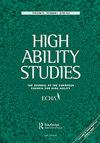天赋总是一种优势吗?资优学生的同伴关系与自我概念
IF 1.8
4区 教育学
Q2 EDUCATION, SPECIAL
引用次数: 36
摘要
本研究的目的是探讨资优青少年与非资优青少年在社会接受和自我概念(同伴关系、学术和一般)方面的差异。此外,本研究旨在探讨以不同的识别标准(即智力测验和教师评价)识别的两组学生之间的差异,以及学生的天赋与社会适应指标之间的关系是否受到性别的调节。斯洛文尼亚小学生404人(男191人;47%,女性213人;53%)参加了研究;其中85人(21%)被认为是天才。资优学生与非资优学生在积极社会计量提名和社会偏好方面无显著差异;资优学生得到的负面提名较少,社会影响也较低,但他们的老师对他们的社会接受度更高。资优学生的学术和一般自我概念较高,但同伴关系自我概念不高。不同认同标准的资优学生在社会接受度和自我概念上没有差异。此外,我们发现性别与资优对同伴关系自我概念有显著的交互作用。研究结果表明,研究资优学生的个体差异在未来的研究中具有重要意义。本文章由计算机程序翻译,如有差异,请以英文原文为准。
Is being gifted always an advantage? Peer relations and self-concept of gifted students
The purpose of this study was to investigate the differences between identified gifted adolescents and adolescents not identified as gifted in terms of social acceptance and self-concept (peer relations, academic, and general). In addition, we aimed to investigate the differences between two groups of students identified according to different identification criteria (i.e. intelligence test and teacher assessment), and whether the relationship between students’ giftedness and the indicators of their social adjustment was moderated by gender. A total of 404 Slovenian elementary school students (191 males; 47%, 213 females; 53%) participated in the study; among them 85 (21%) were identified as gifted. No significant differences were found between gifted and non-gifted students in positive sociometric nominations and social preference; gifted students received less negative nominations and had lower social impact, but were assessed as more socially accepted by their teachers. Gifted students reported higher academic and general but not peer relations self-concept. No differences in social acceptance and self-concept were found between the groups of gifted students identified with regard to different identification criteria. In addition, we found significant interaction effects between gender and giftedness for peer relations self-concept. The results indicate the importance of investigating individual differences among gifted students in future studies.
求助全文
通过发布文献求助,成功后即可免费获取论文全文。
去求助
来源期刊

High Ability Studies
Multiple-
CiteScore
4.80
自引率
11.10%
发文量
7
期刊介绍:
High Ability Studies provides a forum for scholars in a variety of disciplines associated with the development of human abilities to their highest level. It is a medium for the promotion of high ability, whether through the communication of scientific research, theory, or the exchange of practical experience and ideas. The contents of this journal are unique in reflecting concerns and recent developments in this area from childhood and across the whole life span in a variety of contexts. Far from being restricted to the traditional focus on high-level cognitive development, it also presents investigations into all other areas of human endeavour, including sport, technology, the arts, business, management and social relations.
 求助内容:
求助内容: 应助结果提醒方式:
应助结果提醒方式:


